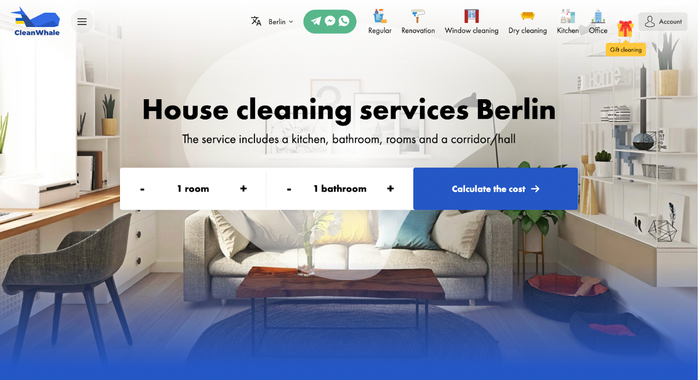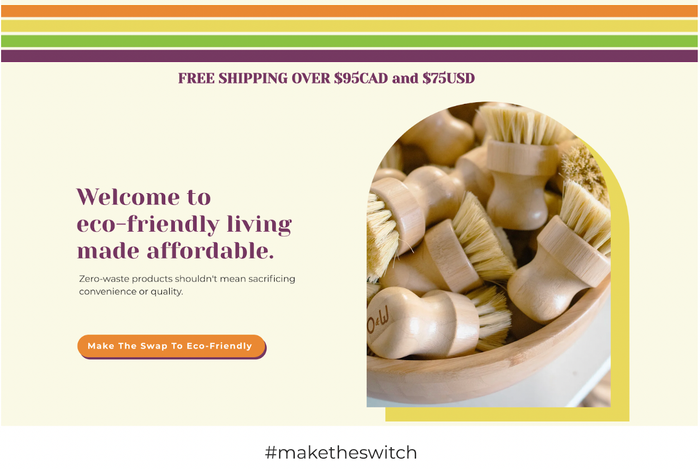You must admit that the idea of entrepreneurship can be captivating. Otherwise, you wouldn't be reading this article!
Seeing successful business owners might spark a desire to start your own venture. However, the reality of entrepreneurship is more complex than it appears.
While owning a business can be rewarding, it requires careful planning, hard work, and a solid foundation. Finding the right business idea is the first step – it can make the difference between a thriving enterprise and a struggling startup. A lackluster concept may lead to challenges, while a well-thought-out idea aligned with market needs can pave the way for success.
Today, we'll guide you through some ideas, along with good practices, worth following and pursuing.
Best ideas for starting your own business
There are, literally, thousands of potential business ideas you can go for. We decided to collect the most popular and feasible ones and group them into a few "baskets" for you to choose from.
#1 Byte-sized ventures (online + low budget)
Who needs an office when your most important business partner is your pajamas?
In byte-sized ventures, where your laptop is your storefront and your Wi-Fi connection is your lifeline.
These businesses are characterized by their low entry barriers and the ability to start with minimal investment. What sets these business ideas apart is their flexibility and scalability. You can run these ventures from anywhere, at any time, and often with just a computer and an internet connection.
They're perfect for those who want to dip their toes into entrepreneurship without risking their life savings.
Byte-sized ventures often leverage online communities to attract customers and grow their brands. They rely heavily on digital marketing strategies, including social media and influencer marketing, to reach potential clients. The successful businesses in this category are those that can adapt quickly to changing online trends and customer needs.
Examples of such services are many.
- Virtual assistant work, where you can help busy professionals manage their schedules and tasks remotely.
- Social media management is another popular option, allowing you to curate and create content for businesses looking to boost their online presence.
- Online tutoring has seen a boom, with platforms connecting knowledgeable individuals with students worldwide.
- Freelance writing and graphic design offer creative outlets with earning potential.
- Dropshipping e-commerce stores allow entrepreneurs to sell products without holding inventory.

#2 Brick-and-mortar business (offline + higher budget)
Ever walked down a bustling street and wondered what it would be like to own one of those charming storefronts? Who said you can't?
Brick-and-mortar businesses are defined by their tangible presence in the local community. Unlike their online counterparts, brick-and-mortar ventures offer face-to-face interactions with customers. They often require a higher initial investment for rent, equipment, and inventory – but they have the advantage of immediate credibility and visibility.
They can create immersive experiences, too, as they can engage all five senses of their customers, something that's hard to replicate online.

Examples of business ideas in this category? Here you go:
- The local coffee shop where regulars gather for their morning brew.
- Fitness centers and yoga studios provide spaces for health-conscious individuals to work on their well-being.
- Handmade craft shops showcase unique, artisanal products that customers can touch and feel before purchasing.
- Gourmet food trucks bring culinary delights to various locations, combining mobility with a physical presence.
#3 Hybrid hustles (online business + offline business)
Hybrid hustle business ideas adapt to both the digital and physical worlds.
These businesses are characterized by their versatility and ability to bridge the gap between online convenience and in-person experiences. What distinguishes them is their adaptability – they can pivot between virtual and physical interactions based on customer preferences or external circumstances.
Hybrid hustles often leverage technology to enhance traditional services or bring physical experiences online. They might use paid advertising to attract online customers to their physical locations, or vice versa. Business owners often attend networking events – both online and offline – to appeal to new target groups.
Examples of such services:
- Personal trainers who offer in-person sessions complemented by online coaching and workout plans.
- Photography services that combine on-location shoots with digital editing and online galleries give clients the best of both worlds.
- Catering businesses with robust online ordering systems allow customers to plan events from their devices before enjoying the food in person.
- Local bookstores that sell physical books alongside e-books cater to all reading preferences.
- Craft workshops that offer hands-on classes supplemented by online tutorials extend the learning experience beyond the physical space.

https://www.paulinagoesfit.com/book-online
#4 Shoestring startups (no to very low budget)
Think you need a huge pile of money to start a business? Not necessarily!
Shoestring startups prove that sometimes, the best things in life – and business – are free (or pretty close to it).
Shoestring startups are all about leveraging your skills and time rather than your savings account. What makes them special is their incredibly low entry cost. Often, all you need is a willingness to work hard and some basic tools you probably already have lying around the house.
Perfect for people who want to test the waters of entrepreneurship without risking their life savings. They're often service-based businesses that rely on building relationships. Word-of-mouth marketing is their bread and butter, and satisfied customers are their best advertisement.
Examples?
- Take dog walking, for example. All you need is a love for furry friends and a pair of comfortable shoes.
- House cleaning services require some elbow grease and basic cleaning supplies.
- Lawn care and gardening can start with just a mower and a green thumb.
- Freelance proofreading only needs your keen eye for detail and a computer.
- And for those looking to help others, errand running or personal shopping for seniors can be a rewarding way to serve your community while earning money.
These businesses might start small, but they can grow into thriving enterprises.

#5 Green and growing (eco-friendly businesses)
You can save the planet AND make a profit at the same time. Green and growing businesses are proving that sustainability and success go hand in hand.
These eco-friendly ventures focus on reducing environmental impact while meeting consumer needs. They're promoting a lifestyle and values that resonate with environmentally conscious customers.
Green businesses often tap into a growing market of consumers who are willing to pay a bit more for products that align with their values. They frequently use innovative materials or processes to minimize waste and energy use. Many also focus on educating their customers about environmental issues, turning their business into a platform for positive change.
Examples include:
- upcycled furniture restoration gives new life to old pieces, reducing waste and creating unique home decor.
- Organic vegetable delivery services connect local farmers with health-conscious consumers.
- Eco-friendly cleaning products manufacturing tackles household chores without harsh chemicals.
- Sustainable fashion design proves that style doesn't have to come at the expense of the environment.
- solar panel installation helps homeowners reduce their carbon footprint while saving on energy bills.

#6 Tech trailblazers (technology-focused, medium to high budget)
These businesses are at the cutting edge of technology, often working with concepts that sound like science fiction. They focus on innovation and their potential to disrupt entire industries. Usually, they require a higher initial investment in equipment and expertise, but the payoff can be enormous if they hit on the next big thing.
Tech trailblazers often need to educate their market about their products or services, as they're frequently introducing entirely new concepts. They also thrive on solving complex problems and pushing the boundaries of what's possible. These businesses often attract tech-savvy early adopters who are excited to try the latest innovations.
Examples:
- App development can create tools that change how we work, play, or communicate.
- 3D printing services are revolutionizing manufacturing and prototyping across industries.
- Virtual reality experience centers offer mind-bending entertainment that was impossible just a few years ago.
- Drone photography and videography provide new perspectives for everything from real estate to filmmaking.
- And AI-powered personal assistant development is creating digital helpers that can manage our lives with increasing sophistication.
These tech-focused businesses are shaping the future, one innovation at a time. If you have a knack for technology, this might be just the right idea for you!

Each category offers a mix of opportunities suitable for different skill sets, budgets, and target markets. Remember, the key to a successful business is finding the right intersection between your passions, skills, and market demand.
#7 Instant entrepreneurs (launch in 24 hours or less)
This business idea might go against every single thing or article you've read so far.
Business usually requires months of planning or research: creating a business plan, adjusting a marketing strategy, and conducting market research activities. But what if you need to act now?
Instant entrepreneurs prove you can go from idea to income quicker than you can say "business plan."
These businesses are all about speed and simplicity. What sets them apart is their ultra-low barrier to entry and ability to start generating income almost immediately. They often require minimal setup, little to no initial investment, and skills you already have (or no skills at all).
To become an Instant Entrepreneur, you'll need a can-do attitude, a smartphone or computer, and the willingness to jump in feet first. These business ideas typically start small but can grow quickly with dedication.
Here's how you could start today:
1. Taskrabbit-style odd job service – sign up on gig economy platforms to offer your skills for quick tasks.
2. Online reselling – start flipping items from your home on a free online auction site like eBay or Facebook Marketplace.
3. Virtual event planning – help people organize online parties or meetings using platforms like Zoom.
4. Print-on-demand merchandise – design and sell custom t-shirts or mugs using sites like Printful or Redbubble.

The only action point to become an Instant Entrepreneur is... to take action. Don't overthink it – just start and learn as you go!
Benefits vs disadvantages of starting your own business
Needless to say, starting a business isn't all sunshine and rainbows. While the potential rewards can be enticing, you should understand the challenges that come with entrepreneurship.
Let's take a balanced look at both sides of the coin.
Pros:
Be your own boss and gain financial independence
As a business owner, you're in charge of your own destiny. You make the decisions, set your own hours, and have the potential to earn based on your efforts. Such freedom can lead to greater job satisfaction and the opportunity to build long-term wealth.
Pursue your passion and create a meaningful entrepreneurial journey
Running your own business allows you to turn your interests into a career. You can create something that aligns with your values and makes a positive impact on the world. It can be more fulfilling and motivating than working full-time for anyone else.
Develop strong relationships with potential customers and clients
As a business owner, you have the opportunity to interact directly with your customers. You can build lasting relationships, understand their needs firsthand, tailor your products or services accordingly, and have full control over this process.
Gain valuable insights into different industries and business models
Running a business exposes you to various aspects of the business world. You'll learn about marketing, finance, operations, and more. With this broad knowledge, you get invaluable insights to use for future ventures or career opportunities.
Opportunity for significant income and personal growth
While not guaranteed, owning a successful business can lead to higher earning potential than traditional employment. On top of that, the challenges of entrepreneurship can push you to develop new skills and grow as a person.
Cons:
Starting a business takes effort and valuable time
Building a business from scratch requires significant time and energy. Long hours and weekend work are common, especially in the early stages. You need to be prepared for the fact that it can impact your personal life and work-life balance.
Need to wear many hats, from marketing to administrative support services
As a new business owner, you'll likely need to handle various tasks yourself – including those you've never done before. This can include everything from bookkeeping to customer service. Juggling these responsibilities can be overwhelming and may take time away from focusing on your core business.
Financial risks and potential for tough times, especially in the early stages
Starting a business often involves financial risk. You may need to invest your savings or take out loans. There's also no guarantee of steady income, especially in the beginning, which can lead to financial stress.
Responsibility for all aspects of the business, including legal and financial
As the business owner, the buck stops with you. You're responsible for complying with laws and regulations, managing finances, and making tough decisions. Such responsibility can be stressful and challenging.
Pressure to constantly innovate and stay ahead in a competitive market
To succeed, you'll need to continuously adapt to market changes and overtake your competitors. This constant pressure to innovate and improve can be exhausting and may require ongoing learning and skill development.
If you still want to get into business after all that, it's important to go in with your eyes wide open. Before you start calling yourself a CEO, take time to prepare yourself for the challenges ahead.
Below, you will find a set of handy factors to take into considerations and practices to follow.
How to get ready for your new business?
#1 Consider costs
Ideas are free, but turning them into a business comes with a price tag.
Here's a breakdown of what potential small business owners should be financially prepared for:
Starting a small business is an exciting venture, but you have to understand the costs involved. The U.S. Small Business Administration estimates that the average startup cost is around $3,000, with home-based businesses typically ranging from $2,000 to $5,000. However, these figures can vary depending on your industry and location.
For example, those entering fields like online retail, accounting, landscaping, or construction, you might be looking at startup costs of up to $5,000. On the other hand, if you're venturing into healthcare, restaurants, or manufacturing, be prepared for initial investments exceeding $100,000.
Clare Guerin - Finance Director
“When it comes to starting a business, financial planning is just as important as a great idea. Many aspiring entrepreneurs get caught up in the excitement of launching their business and end up overlooking the critical financial realities.
“Start by accessing your personal financial situation - can you afford to take a risk? Do you have a safety net to fall back on? Understand your startup costs, including stock, finance costs, technology, and marketing, but also account for your ongoing expenses like premises cost or salaries as well as unexpected costs.
Cash flow is crucial. Even profitable businesses can fail if they run out of cash. Be conservative with projections and plan for slower-than-expected revenue growth. By creating a solid financial foundation, you give your business the best chance to survive and thrive.”

Equipment costs can be a major expense, ranging from $10,000 to $125,000, depending on your specific needs. Don't forget about ongoing operational costs, either! Payroll is often one of the biggest expenses, with an average of $300,500 for five employees in the U.S. Even if you're not planning to hire a big team at first, you should consider it. Healthcare costs are another challenge for new businesses – as you plan your budget, factor in insurance costs for yourself and any employees you might hire.
Location plays a huge role in your monthly expenses. For instance, office space in New York City averages $68 per square foot per month, while Detroit offers more affordable rates at $16 per square foot. However, keep in mind that cheaper rent might be offset by other costs – Detroit, for example, has some of the highest internet service costs at $140 per month.
58% of small businesses in the U.S. start with less than $25,000. With careful planning and budgeting, it's possible to launch your dream business without breaking the bank.
While these numbers might seem like A LOT, remember that startup costs have been trending downward relative to income. According to the World Bank, the cost of business startup procedures as a percentage of Gross National Income per capita in the U.S. was just 1% in 2019.
Taking these potential costs into account upfront, you can better prepare yourself for the financial realities of entrepreneurship – and help you avoid some costly pitfalls later on.
Formula to remember:
Total Small Business Costs (TBC) = Startup Costs (SC) + Equipment Costs (EC) + Operational Costs (OC) + Location Costs (LC)
#2 Conduct market research for your business ideas
Imagine launching your product or service with great fanfare. It's beautifully designed, expertly crafted, and promoted with flair – but sales are disappointingly flat. Why? The answer often lies in that one step many entrepreneurs overlook: knowing your customers before you start.
It’s a very important step in the process. You need to find your target audience.
Contrary to popular belief, your target market isn't "everyone". Start by creating a detailed profile of your ideal customer. Consider demographics like age, income, and location, but don't stop there.
Let's take the example of eco-friendly water bottles. Your target market might be environmentally-conscious millennials. To truly understand this group:
- Research their habits. Are they active on social media? Do they prefer sustainable brands across all product categories?
- Identify their online presence. Which platforms do they use most? Are they part of specific environmental groups or forums?
- Understand their triggers. What motivates their purchasing decisions? Is it guilt over plastic waste, a desire to make a statement, or purely practical concerns?
- Analyze their shopping behavior. Do they prefer online shopping for convenience, or do they value the in-store experience of physically inspecting products?
- Examine their value hierarchy. How do they balance sustainability against price? Are they willing to pay a premium for eco-friendly products?
- Study their lifestyle. Are they outdoor enthusiasts? Fitness buffs? How does your product fit into their daily routines?
Learn how your product can solve their problems better than your competitors.
#3 Take care of legal requirements
Starting an online business without understanding legal requirements is like trying to fly a plane without a license. It might seem exciting at first, but you're headed for trouble.
Many aspiring entrepreneurs think small businesses don't need much legal work. This is a dangerous myth. Whether you're offering consulting services, running an online store, or starting a handyman business, you need to follow the rules.
First, register your business name with the right government agencies. Next, get all necessary licenses and permits. Don't forget about tax responsibilities – they're important for every business owner.
For example, if you're launching an online course platform, you'll need terms of service, a privacy policy, and possibly certifications in your particular industry. Skipping these steps can lead to fines or even force you to shut down.
Successful entrepreneurs don't take shortcuts with legal matters. They understand that covering all legal bases helps their business grow without costly interruptions.

#4 Prepare a successful business plan
Many small business owners start with great enthusiasm but soon hit roadblocks because they lack a solid plan. How can you avoid this common pitfall?
A well-prepared business plan is more than just paperwork. It should outline your goals, the strategies for reaching them, and how you'll overcome potential challenges. You can't just wing it and expect to become a successful entrepreneur.
For instance, if you're starting a virtual assistant service, your plan should cover your target market, pricing strategy, and how you'll use social media marketing to attract clients. It should also address potential pain points like managing multiple clients or scaling your business.
Your plan doesn't need to be a lengthy document. Even a lean startup approach can work, as long as it covers the essentials. Include sections on your business model, marketing strategy, and financial projections.
A good business plan is flexible. Review and update it regularly as your business grows and evolves.
#5 Think about funding for your business idea
Starting a business is exciting, but what happens when your initial funds run dry? Many small business owners face this challenge, struggling to keep their ventures afloat. How can you make sure you have enough capital to sustain and grow your business?
A one-time investment is NOT enough. In reality, you need to plan for ongoing funding. This is true whether you're opening a physical store, launching an online tutoring service, or venturing into real estate investing.
Evaluate your funding options. If that's needed, look into small business loans from banks or online lenders. Search for investors who believe in your business idea. Apply for grants that support new ventures in your industry.
Don't overlook crowdfunding platforms, as they can be great for testing market interest in your product or service.
For example, if you're starting a graphic design business, you might explore options like business credit cards for short-term needs, or seek out a co-founder who can bring additional funds and skills to the table.
On top of that, consider ways to generate passive income streams that can support your main business. This could involve creating digital products, offering online courses, or any number of side hustles.
Use lean startup principles to keep costs low. Leverage free or low-cost tools for tasks like social media marketing and customer relationship management.
For instance, Capsule CRM provides a free CRM solution ideal for small business owners who are just starting out but might have plans to scale.
#6 Rethink team building
You might not follow this step straight away, but eventually, you might. Especially if your business ambition is to grow.
Hiring employees is relatively simple – if we're talking about hiring, and hiring only. But what's challenging is creating a cohesive unit that shares your vision and can turn your great business idea into reality.
You might be able to go solo for a long time, but at some point, you might find out you need a pair of helping hands. Here's how you should go about that:
- Start by clearly defining the roles you need to fill. What skills are must-haves for your business's success? Do you need technical expertise, creative talent, or strong administrative support?
- Look beyond resumes. While skills are important, cultural fit is equally crucial. Seek individuals who share your passion and can help your business flourish.
- Consider diverse perspectives. A team with varied backgrounds and experiences can bring new business ideas and innovative solutions to challenges.
- Don't rush the hiring process. Take the time to thoroughly vet candidates. Consider trial projects or internships to see how potential team members perform in real-world scenarios.
- Invest in your team's growth. Offer opportunities for professional development or personal training for their positions.
As a small business owner, your team is an extension of yourself. They represent your brand to the world, so choose wisely and nurture their growth alongside your business.
#7 Leverage technology
Leveraging the right technology can be the difference between a struggling startup and a thriving enterprise. But how to select the best ones, especially when you're only just starting out?
- Start by assessing your business needs. Are you running an e-commerce store that requires inventory management? Or perhaps you're offering personal training services and need a reliable scheduling system?
- Invest in a solid CRM system. Such a system helps you keep track of client interactions, manage leads, and personalize your service. You can also integrate it with other tools. The right CRM is invaluable for building long-term customer relationships – and that's what you need to grow your business.
- Consider automation tools. These can handle repetitive tasks, freeing up your time for more strategic activities. From email marketing to social media posting, automation can increase your efficiency on the spot.
- Don't overlook cybersecurity. As more businesses move online, protecting your and your customers' data is no longer optional. Invest in reliable security software and educate your team (if you've already built one) about best practices.
- Explore cloud-based solutions. They often offer flexibility, scalability, and cost-effectiveness – especially for new businesses with fluctuating needs.
Keep an eye on emerging technologies in your industry. Whether it's AI for customer service or blockchain for supply chain management, staying informed helps you make strategic decisions about which technologies to adopt.
But remember, technology should serve your business – not the other way around.
#8 Assess risk management
Starting your first business is exciting, and no one wants to fail. However, you should always have a plan "B". Even the most brilliant initial idea can falter if you're not prepared for potential obstacles. That's where risk management comes in – it's about anticipating challenges and having a game plan to tackle them head-on.
Begin by identifying potential risks specific to your industry. Are you vulnerable to supply chain disruptions? Could changes in regulations impact your operations? Knowing about these threats helps you develop targeted strategies to mitigate them.
Don't overlook the power of networking events. Attending these gatherings can connect you with other entrepreneurs who've faced similar challenges.
Don't put all your eggs in one basket.
Consider diversifying your revenue streams. Relying on a single product or service can leave you vulnerable. Explore complementary offerings that can provide a safety net if your primary business faces challenges.
Insurance is a huge aspect of risk management. While it might seem like an unnecessary expense for a new business, the right coverage can protect you from potentially devastating losses. Research policies that are relevant to your industry and business size.
Develop a crisis communication plan. A small issue can quickly escalate if not handled properly. Having a clear strategy for addressing public relations challenges can help maintain your reputation during tough times.
You can't avoid all risks in business. But you can take calculated risks.
Sometimes, a good business idea requires stepping out of your comfort zone. The key is to do so with a clear understanding of potential outcomes and a plan to handle them.
How Capsule CRM can help you manage your business idea
Have we inspired you enough?
Are you filled with enthusiasm?
Can't wait to get started?
We hate to break it to you, but then comes the overwhelming task of organizing your thoughts, tracking potential clients, and managing the million details that come with getting started...
Imagine a streamlined system that helps you turn your innovative concept into a thriving business. That's exactly what Capsule CRM can do!

Think of Capsule as your idea incubator. At first, it allows you to capture all the sparks of inspiration, from initial brainstorming to concrete action steps. Store notes, track competitor research, and organize potential customer segments – all in one central location.
No more scribbles on napkins or lost ideas buried in your email.
But a great business idea needs action.
Capsule helps you manage your launch process effectively. Use it to create and track tasks, schedule meetings with potential partners or investors, and centralize communication with collaborators. You're organized, accountable, and moving forward.
Don't forget the future!
As your business idea takes shape, Capsule helps you manage your initial customer base. Create profiles, track interactions, and plan targeted outreach campaigns. You're set up for success as you build strong relationships with your early adopters.
The best part? Capsule offers a free plan!
Perfect for bootstrapping entrepreneurs who need to manage their resources wisely. With the free version, you can store information on up to 250 contacts and access it all from the mobile app – ideal for staying on top of things when you're out and about building your dream.
Conclusion
Having a great business idea is just 1% of the journey – the real challenge is all about execution.
We hope that we have inspired you with some business ideas, but remember, putting them into action is what truly matters.
Stay focused, be diligent, and let Capsule CRM help you manage the details so you can concentrate on growing your business. Your success depends on how well you execute your plans, so start now and turn your business ideas into your revenue drivers!



![Business statistics every business owner should know [2026]](https://cdn.sanity.io/images/poftgen7/production/5619faf6a65f53406d3e554c11c9e894402d4397-5760x3240.jpg?rect=5,0,5751,3240&w=300&h=169&q=75&fit=max&auto=format)
